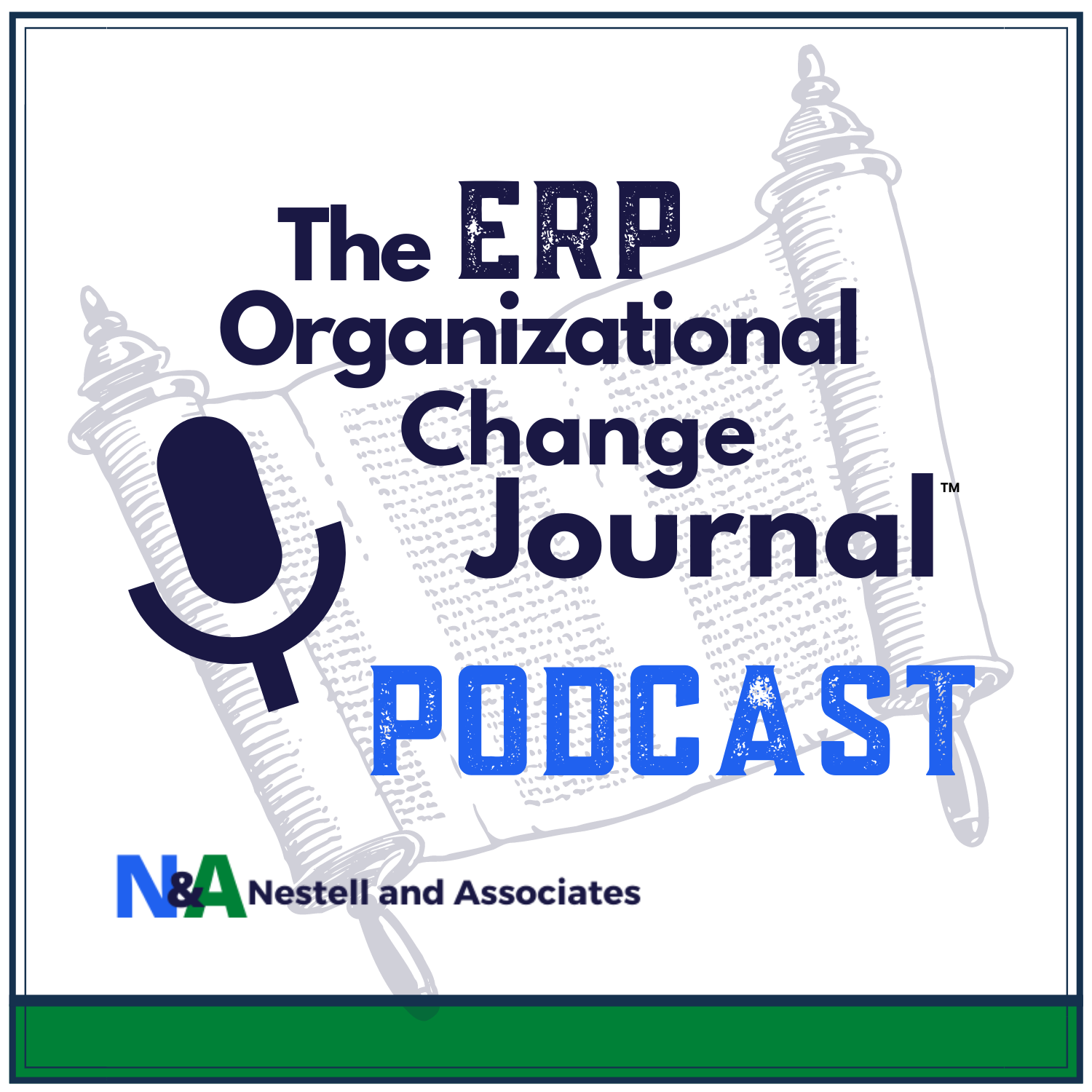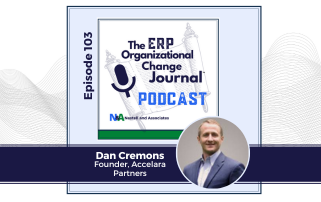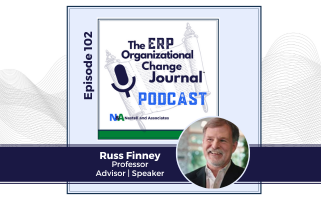About this Episode
In this episode, we discuss “Reframing Organizations” with Dr. Lee Bolman. Dr. Bolman and his colleague, Dr. Terrence E. Deal, are co-authors of “Reframing Organizations: Artistry, Choice, and Leadership”, the topic of this episode.
Organizations sometimes require a “reframing”. Sometimes this reframing can be small and sometimes it can be large. Sometimes it is out of forced necessity and sometimes out of choice. Whether it be for survival or to realize the most effective organizational performance (as in large-scale ERP organizational change), it is an incredibly valuable idea. When varying and mixed stakeholder groups exist within organizations, employees will have different ideals, perceptions, and understandings of organizational change and performance efforts, which has a direct impact on change acceptance from the employees. But, alignment and improved organizational performance often come through effective “reframing”.
We discuss the idea of reframing further.
Dr. Lee Bolman
After more than half a century as an author, speaker and professor of leadership and organization studies, I retired as Professor Emeritus from the Marion Bloch/Missouri Chair in Leadership at the Bloch School of Management, University of Missouri-Kansas City. But I’m still doing what I love–writing and teaching.
More about Lee
My latest books include Reframing Organizations: Artistry, Choice and Leadership (7th ed., September, 2021), How Great Leaders Think: The Art of Reframing (2014) and Reframing the Path to School Leadership (3d ed., 2018), all with Terry Deal, as well as two books with Joan Gallos: Engagement: Transforming Difficult Relationships at Work (2016), and Reframing Academic Leadership (2d ed., 2021). My books have been translated into more than ten languages.
The Harvard Extension School is kind enough to let me teach an occasional course in organizational behavior, and that, combined with the pandemic, is helping me explore the possibilities in online teaching. Nothing equals being in the same room with students, but Zoom has its charms, including the ability to connect to talented and motivated professionals around the US and beyond.
After nine years in New Haven, Connecticut, I left Yale with a B.A. in History and Ph.D. in Organizational Behavior. After Yale, I taught at Carnegie-Mellon University for 4 years and and then spent 21 years at the Harvard Graduate School of Education, where I served as educational chair of summer executive programs, and as Principal Investigator on federally-funded research initiatives. I then spent 19 years as Professor and Marion Bloch/Missouri Chair in Leadership at the Bloch School of Management, University of Missouri-Kansas City, before returning to the Boston area in 2012.
I live in Brookline and Stockbridge, Massachusetts, with my wife, Joan Gallos, and a lovable Springer Spaniel, Charles Darwin. My six children and three grandchildren are scattered from coast to coast across America.
Website https://newsite.leebolman.com/
Follow Dr. Lee Bolman
Stream this Episode Here and Subscribe on all Major Platforms
We want this podcast to be the most useful podcast you listen to. And we need your help! Please leave us a podcast review!
Episode Mentions
Gallos, J. V., & Bolman, L. G. (2021). Reframing academic leadership. John wiley & sons.
Bolman, L. G., & Deal, T. E. (2014). How great leaders think: The art of reframing. John Wiley & Sons.
Bolman, L. G., & Deal, T. E. (1995). Leading with soul: An uncommon journey of spirit. Jossey-Bass.
Bolman, L. G., & Deal, T. E. (2018). Reframing the path to school leadership: A guide for teachers and principals. Corwin Press.
Bolman, L. G., & Deal, T. E. (2011). The wizard and the warrior: Leading with passion and power (Vol. 12). John Wiley & Sons.
Bolman, L. G., & Gallos, J. V. (2016). Engagement: Transforming Difficult Relationships at Work. John Wiley & Sons.
Episode Highlights
05:50 What does it mean to “Reframe” organizations?
08:30 Can you share with our listeners what motivated you to write “Reframing Organizations: Artistry, Choice, and Leadership”? Second, please explain why you specifically choose to include “Artistry” and “Choice” in your title.
13:20 Can you tell our listeners a little bit about “Reframing Research”? I know that there is a lot of studies and dissertations that use or test reframing concepts. Just from a high level, research is often driven by a demand, why such a demand for reframing research? What is its value?
15:40 As you state in the book “An organization’s structure represents its best effort to align internal activities with outside pressures and opportunities”. But how do you know if that structure is best? In PE there tends to be a lot of structuring and restructuring, but what are some generic issues and challenges in “reframing” despite the potential benefits?
21:50 In your book, you discuss the ideas of the “Structural Frame”, “Human Resource Frame”, “Political Frame”, “The Symbolic Frame”….and we’ll spend some time on each of these. But what is the “Structural Frame”?
23:16 What can the Structural Frame tell us about teamwork? Or maybe asked another way, anything you can say in general in terms of teamwork and interdependence and maybe how the right structure can improve teamwork and performance?
26:06 What is the “Human Resource” Frame?
27:30 You share in your book that “many highly successful organizations have gone in another direction: investing in people on the premise that a highly motivated workforce is a powerful competitive advantage.” We know that in ERP Organizational Change, group and individual diversities (in its many forms) and dynamics play an incredibly substantial role. From the perspective of the Human Resource Frame, what can leadership consider in which to align these different views and perspectives?
30:07 What is the political frame?
34:34 We know that power, conflict, and coalition building are inherent in any organization. And I think that there is such a thing as good politics and bad politics…and motivations. But what can you share in terms of managers as political agents and their role in managing politics?
38:14 Conflict in organizations is a real thing, but how can you ensure that it is healthy and productive conflict?
43:11 What is the symbolic Frame?
43:54 What role does culture play in successful organizational change? And any tactical advise on promoting a strong organizational culture?
51:29 What would be the primary role of organizational leadership in terms of viewing “Reframing organizations” from these lenses, or frames, that you shared today? What is the first step in learning how to utilize and integrate these frames for most effective performance and change strategy?
1:01:58 To share a question that you ask in your book “What do we know about Good leadership”?
1:05:15 Lee, we could go on for hours. But our last question. As fellow practitioners, we absolutely benefit from learning from our colleagues and friends, both “boots on the ground” as well as researchers. How would you summarize this conversation? That is, if you had to distill your work into 3 or 4 sentences, what would you say to ERP organizational change practitioners?
More Related Episodes from TheERPocj & Blog Posts
Episode 51 ERP Organizational Change: How to Leaders Can Prepare with guest Maureen Metcalf
Episode 49 ERP Organizational Change: Stakeholder Dynamics with guest Samantha Jung-Fielding
Episode 41 Taking Smart Risks: How Sharp Leaders Win When Stakes are High with guest Doug Sundheim
Episode 19 Training Evaluation with guest Dr. Jim Kirkpatrick
Episode 15 Effective organizational Change with guest Dr. Eric A. Canny
Episode 10 Leadership: Myths, Behaviors, and Practice with guest Dr. Gary A. DePaul
Episode 3 Transformative Leader With guest Ron J. West
Episode 2 Organizational Performance Improvement with guest Dr. Richard E. Clark
Value of ERP Stakeholder Group Communication
Latest Episodes
Human Capital in PE-Backed Companies: Strategies for Leadership and Talent Management
Human Capital in PE-Backed Companies: Strategies for Leadership and Talent ManagementEpisode Overview - PE-backed Human Capital Strategies Today’s episode centers on the pivotal role of human capital in PE-backed companies, emphasizing how strategic leadership and...
ERP Organizational Change: Technology Strategy
ERP Organizational Change: Technology Strategy and Keys to SuccessEpisode Overview - Technology Strategy In general, at the highest level of categorization, there seems to be consensus on the importance of people and culture, informational technology, and project...
AI and Private Equity Synergy: Fueling Business Transformation
AI and Private Equity Synergy: Fueling Business TransformationEpisode Overview - AI in PE Strategies In this episode, we explore how AI and Private Equity synergies are fueling business transformations and reshaping investment strategies and operational efficiencies....






0 Comments